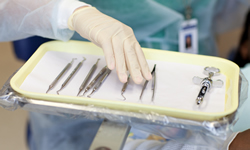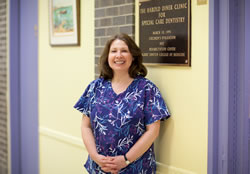

Assuring Dental Care for All
Einstein's Special Care Dentistry Unit Treats Vulnerable Population
It is 20 steps and one left turn from the entrance of the Rose F. Kennedy Center at Einstein to the receptionist’s desk for the Special Care Dentistry Unit, but for Lloyd Vener it is a terrifying journey. He struggles against his mother and tries to pull away, crying and hooting. At the clinic door he throws himself to the floor in a desperate attempt to halt any further progress. Flailing, he tries to escape through the doorway.
For more than half a century, the Children’s Evaluation and Rehabilitation Center (CERC) at Einstein has been serving New York’s most vulnerable residents — children with intellectual and other disabilities. For Lloyd’s mother, Anna Mae Vener, CERC’s Special Care Dentistry Unit is the only place she knows where she can get him the care he needs. Lloyd has been going to the dental clinic since he was three years old.
Now a full grown man, at six-foot-one and 150 pounds, he still falls to the floor, kicks, makes strange vocalizations and resists his mother’s attempts to calm him. “He’s very strong,” said Ms. Vener. “And his instinct is to resist.”
For clinic staff members this is nothing out of the ordinary. The dentistry program is the only one of its kind in New York City — able to provide anesthesia through conscious sedation. This permits individuals with severe developmental and behavioral problems to receive the dental care they need.
“We see a broad range of patients,” said Farah Alam, D.D.S., director of the unit, “from those with mild ADHD to those that are profoundly physically, mentally and medically impaired. They really depend on us for their general well-being.”

Tools of the tradeIn fact, finding medical and dental care for someone with special needs can be a “mission impossible” for families and caregivers. Each year, the Special Care Dentistry Unit handles 5,000 patient visits, and more than 500 of those patients have severe developmental and behavioral disabilities. “Not many dentists are willing or able to see patients with these kinds of special needs,” said Dr. Alam. “It takes a lot of patience and a lot of love.”
The relative cost savings of the CERC outpatient treatment is significant. "Without the CERC program, these individuals would require general anesthesia in a hospital operating room at a total cost of between $7,000 and $10,000 per procedure, even for a simple cleaning," said Robert Marion, M.D., executive director of CERC and the Ruth L. Gottesman Chair in Developmental Pediatrics. “The CERC dental clinic performs sedation procedures at a cost of approximately $250 each. If the procedures we do for our patients were done in a hospital setting, the cost to the city, state and federal governments could reach $5 million per year versus a modest $125,000 at CERC.”
Elvira Medina of the Bronx knows the value of the dental program firsthand. Her son Ruben has been going to the clinic since 1989. Ruben, who is 27, has autism.
“Oh, he was so fearful of going to the dentist,” she recalled. “We used to have to drag him in. He would act out and we couldn’t even get him in the waiting room. He was so scared.”
While it was difficult enough when he was small, as he grew it became even more of an issue. He’d become dead weight and refuse to move, or act out wildly to try and get away. And, he got bigger and taller — eventually outgrowing his mother.
“He’s bigger than I am,” said Ms. Medina. “And, he’s fearful. A regular dentist doesn’t understand our population. A patient like Ruben doesn’t fully comprehend what is happening, so you really need to sedate him, even if it’s just for a cleaning.”
But going to the clinic is about much more than just getting dental work. “They are so sensitive to what parents go through,” Ms. Medina added. “They get to know us and they make Ruben feel that he is taken care of.”
For example, Ruben loves Thomas the Tank Engine, so the staff will tape up his Thomas pictures where he can see them from the dental chair. They have gotten to the point where Ruben will now come to the clinic, sit in the waiting room, get in the dental chair and even let the dentist count his teeth before needing any sedation for treatment.
“These little details take time and effort,” continued Ms. Medina. “You won’t get that kind of dental service anywhere else. I know for a fact that a regular dentist wouldn’t tolerate any of that.”

Phyllis Bruno at the clinic entranceFor head dental assistant Phyllis Bruno, who has worked at CERC 36 years, this attention to individual needs is what makes the dental clinic special. “We go the extra mile because that is what we’re all about,” she said. “There is a lot of TLC involved.”
“We take our time, we introduce things slowly, we don’t do anything that will traumatize them,” she added. “We make it positive, so that they want to come back.”
While, initially, patience is key, once a patient is in the chair that all changes. For these clients who go through so much just to make it to the dentist’s chair, it is imperative to get as much dental care done in the time allowed as possible. “We work as fast as we can,” said Chang Ryu, D.D.S, fellow in special care dentistry.
During the time Ms. Bruno has worked at the clinic, the care given and the people served have grown exponentially. When the clinic launched 40 years ago, only children were served as part of the center’s initiative. But, as the children receiving treatment grew up and started to age out of the program, CERC evolved in order to continue providing the care they need. As a result, there is no longer an age restriction for receiving clinic services.
“We realized, ‘Hey, where will these kids go?” said Ms. Bruno. “Now, we do everything from pediatrics to geriatrics. We even fit dentures.”
Because of this, the dental clinic has become a resource and touchstone for generations of families in the community. “I am seeing people we treated as children coming in with their children, and then their children’s children,” said Ms. Bruno.
That includes people like Nancy Leandro, of the Bronx, who first came to the CERC more than 40 years ago as a 3-year-old with cerebral palsy. Years later, when her own daughter was diagnosed with diabetes, she turned to the center for help. And, now, the center’s programs are helping her grandson Austin Lee, who has been diagnosed with autism. “CERC is my home away from home,” said Ms. Leandro. “They know how to explain things to me and I feel comfortable going there. The people that work there treat me as a person.”
That is the guiding principle for CERC and its Special Care Dentistry Unit. “Those of us who can, we need to do for those who can’t,” said Dr. Alam. “We have parents who come in here and say, ‘There is no one else who is willing to see our child.’ It takes more effort, and it takes more time, but they have no voice and cannot take care of themselves.”
Ms. Bruno agrees. “I feel like it’s our mission,” she said. “We provide our patients with something that no one else can.”
Posted on: Tuesday, January 25, 2011


